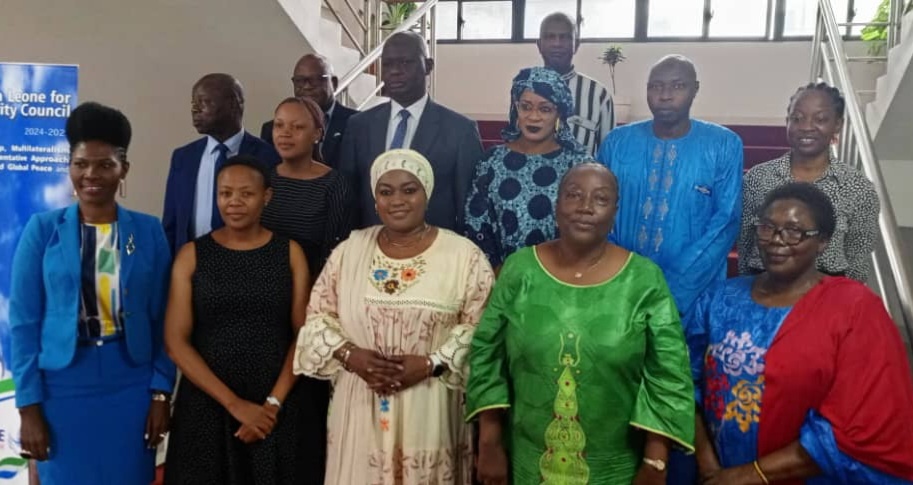Sierra Leone’s Deputy Minister of Foreign Affairs and International Cooperation, Mrs Francess Alghali today received a team from the African Platform on Children Affected by Armed Conflict, an agency of the African Union.
The team leader, Her Excellency Jainaba Jagne, conveyed appreciation to the Government of Sierra Leone and the Foreign Affairs Ministry for honoring the request of AfCAAC for the solidarity and lessons-learning mission in Sierra Leone and expressed profound gratitude for the exceptional protocol and warm welcome they received in Sierra Leone since their arrival.
“The main objective of our mission will be to provide us the opportunity to learn from your best practices, your strategies, and the programs that you have implemented to rehabilitate and reintegrate and develop the children affected by armed conflict”, she said.
She said that the African Union’s commitment to protecting the rights and welfare of children in situations of conflict was unequivocal. She was however sad to report that, children continue to suffer high rates of great violence in situations of conflict. In recognition of the pervasive negative impact on the children, therefore, the African Union has stepped up efforts to address the violence against children before, during, and after conflict.
She said that the commitment was translated into a document of several instruments such as the African Charter on the Rights and Welfare of the Child and several other documentations. But despite those efforts, she said, children continue to suffer from great violations in situations of conflict including killing, maiming, abductions, sexual violence and recruitment by armed forces and armed groups indiscriminate attacks on schools and hospitals, and the denial of humanitarian access.
“It is on this basis that the African Platform on Children Affected by Armed Conflict was established at the African Union to keep the issue of protecting the children high on the agenda of the African Union and to ensure the rights and welfare of children in situations of conflict remains a priority for decision-makers”, she emphasized.
As part of the strategy, the platform identifies countries with opportunities for field visits and interactions with member states with the children and other key stakeholders. The Sierra Leone mission, therefore, is a solidarity and learning mission.
She also expressed concerns about the increase in conflicts on the continent in recent months.
“The platform has to assist children in these conflicts. Thus, we have to learn from countries that have been through such conflicts and have successfully supplied the requisite support to their citizens such as you have done here in Sierra Leone”, the Ambassador said.
In welcoming the team, the Deputy Minister thanked the Commissioner for congratulating Sierra Leone and said that Sierra Leone will continue to look forward to the support of the African Union and all member states to ensure that Africa makes a difference at the UN Security Council.
“We are happy to have you here to learn from us…We are glad that the team from the AU chose Sierra Leone to come and see what we have done to continue to consolidate the peace in our country and to continue to help our children”, she said.
Mrs Alghali recalled several institutions that were set up after the war in Sierra Leone to address issues of child soldiers; key among them were the Disarmament, Demobilization and Reintegration and the National Commission for Social Action(NaCSA).
Though the DDR had been dissolved, she encouraged the team to visit NaCSA which has continued to date to address issues of disadvantaged groups like women and children linked with the war.
She recommended the team visit civil society organizations that played a key role in reintegration, trauma, and counseling after the war while citing Fambul Tok as instrumental in resolving conflicts in the typical African methods to address healing, reconciliation, and peacebuilding at the community level outside the formal judicial setting.
The team will be visiting other related ministries in charge of such projects and programs, like the Ministry of Gender and Children’s Affairs, Ministry of Social Welfare, Education Health and Sanitation, and the Justice Ministry among others.
The visit will additionally facilitate the learning opportunity and the sharing of the best practices including the development of programs and projects that promote the rights and welfare of children in post-conflict situations which can be replicated in other member states.
Credit: Directorate of Strategic Communications MoFAIC, Freetown.











